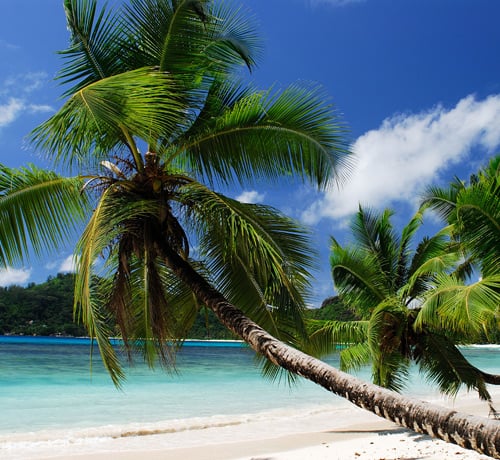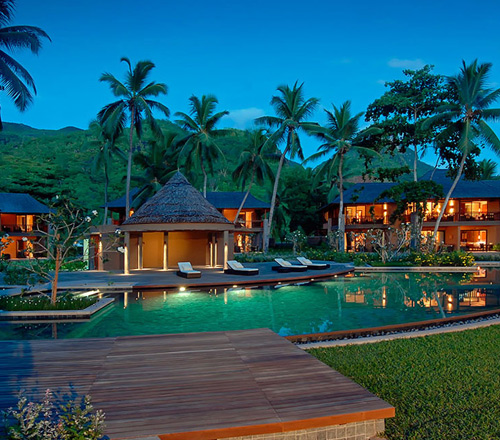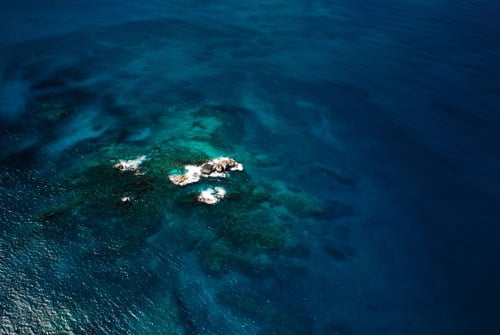Tanya Pampalone visits the Indian Ocean utopia of the Seychelles and is enchanted by the island life of the rich and famous
This is how you arrive on Denis Island: after bouncing through the air for 25 minutes on an Air Seychelles 19-seater De Havilland Twin Otter Series 300 with a no-smoking sign, a no-cellphone sign, a barf bag and emergency procedures with helpful instructions such as "remain calm" in the seat pocket in front of you, the inky water will finally turn turquoise and a 900m grass landing strip will appear on a blink of an island circled in white sand. Suddenly you will be rumbling down the runway.
A woman with weepy eyes will arrive on a golf cart to take you down a winding jungle path laced with palm trees, mentioning, as you pass century-old giant tortoises in a wooden pen, that: "We have to be careful that they keep off the runway."
You will arrive at a Bali-style outdoor pavilion with oversized lounge seats and chandeliers fashioned out of whitewashed branches and will be presented with a mango coconut frappé in a cocktail glass. By this time you will have realised that you have found paradise.
The doors on your beachfront chalet — there are just 25 of them on this 152ha private island on the northeastern edge of the Seychelles — do not lock. Your bathroom comes with two showers and an oversized oval bath and is outside in your private back garden. Your front garden, which faces turquoise waters that lap upon a white-sand beach, are shrouded from your neighbours by a snarl of luminescent green shrubbery with tiny white flowers. There will be wooden deck chairs, a browned palm-frond umbrella and a gracious wooden gazebo with a swooping fan, which sits above a king-size day bed with two burgundy pillows.
This is how it is on Denis: people wear black-and-white and flowered bikinis, denim miniskirts with oversized pockets worn low on their waists and beige cotton sundresses. They have copper skin and long bare legs, white-blonde hair bleached by the sun and tied up in wispy buns. They are fit and young and beautiful and in love. They are ageing, with paunches popping over their Billabong shorts and are losing the last of their graying hair. They are French and middle-aged and smoke Gauloises. They are British and do not smoke and have Asian features and wear nothing but swimming costumes and flip-flops.
Over dinner in the outdoor dining area with the endless buffet that sits above the bath-temperature circular pool, a reserved middle-aged Russian couple toast with generous glasses of white wine. A German man and his wife trade a digital camera over their small table to take photos of each other so they can keep memories of paradise on their laptop. They will email their photos to friends who will "oooh" and "aahhh" and ask whether the pictures were Photoshopped or is the water really that clear? Does it really look like that? And they will say it's real. Can you believe it?
On Denis Island there is no cellphone reception, you cannot pick up your BlackBerry email, there are no TVs in the chalets — but there is air-conditioning.
Kathy and Michael Mason bought their own private island in 1999 from an eccentric Frenchman by the name of Pierre Burkhardt, who put in the original airstrip and built the hotel on Denis.
Kathy Mason was already deep in the tourism business — she built up Mason's Travel, one of the top travel agencies on the Seychelles, herself, and she has done the tastefully understated decor. Michael Mason rides around the island in his golf cart, a thin cigar between his lips, a Denis Island baseball cap on his sunburnt head. He is said to have been a fisherman once. Now he runs the farm — the pigs, the chickens, the scrap-metal heap, the greenhouse, the turtle nursery, the dairy cows and the wood shop.
The chalets are simply furnished with the spirit of a deserted island — with fresh gourmet food and every need cared for — firmly in place. In the tourism trade this is what you would call barefoot luxury.
Bessie Etienne has tight brown curls and deep-set brown eyes and around her neck she wears a tiny golden coco de mer, the famous Seychelles bum-shaped fruit, once thought to have aphrodisiac qualities. Etienne is the island's marketing manager.
In her thick French accent, she loves to tell a good story. There's the one about the couple who come every year like clockwork and have penchant for, well, being naked as often as possible. And there's the one about the high-strung Australian woman who arrived on Denis to find out she couldn't get email or cellphone calls. The woman freaked out and told the staff she wanted off the island immediately. But the next morning the Australian woke up placid. She changed her mind, immersed herself in the island life and ended up staying 21 days. She comes back every year.
That was a while back. Since then, Denis has hooked up email access to a computer in the library and plugged in a TV for those who couldn't bear not to watch things such as, say, the World Cup. But Etienne says it's the same old story with those who come here: half of the people who visit end up coming back.
And why not?
Here you can have quail eggs, sunny-side up, for breakfast. You will have fresh pineapple and all the mangos, coconuts and rose apple (a small, bitter, waxy-looking fruit) you can eat. You will have flakey croissants for breakfast each day and perhaps yellowtail sushi or grilled red snapper for lunch, which you may catch yourself on a deep-sea fishing trip when you may or may not see a dozen manta rays at a time, which you may or may not enjoy as you could get seasick before or after catching a 4kg yellowtail tuna whose blood is drawn and spilled with a swift knife through the gut and tossed into the storage compartment for safekeeping.
On the deck of the dive hut, Jean Paul Valentin, who has short dreadlocks pulled back into a ponytail and an unruly goatee, eases back into one of the wooden chairs and takes a drag of his cigarette.
Valentin is a freelancer, a dive instructor and sometime skipper who gets around. He's on Denis for eight days, then it's back to Mahé.
"I like my freedom," he says. "I like to move from A to Z and then to W." He was in Praslin — where he was born — just last week. He worked on La Digue for two years and on Silhouette.
"I like the island life," says Valentin. "Everything is cool and slow. You wake up, you put on your sunglasses, you walk down to the beach. You don't have to put on a tie or iron your clothes. Yeah, so you get difficult clients, you get those who are friendly and those who are talkative. The staff? They go crazy being here for such long stretches, but that doesn't apply to me."
But what does apply to him is the recent drop in yacht charters, which has him doing less skippering than he'd like. He thinks it could be as high as 50% down, thanks to the Somali pirate scare. The most recent around here involved the hijacking of a yacht in October last year when a retired British couple, who were sailing from the Seychelles to Tanzania, were seized.
It's become something of a problem here in paradise. According to the government paper, The Nation, piracy has caused a 4% loss in GDP.
"Charters have gone down; a lot have cancelled," says Valentin. "People are freaking out. The media exaggerates, that's the problem. The tourists think the pirates are on the shore, waiting to kidnap people. We skippers have a reason to freak out but that's because we are in international waters. But here? Island hopping? No problem. The pirates are in our own backyard but they are not under our noses."
This how it goes at the domestic terminal on Mahé: Madonna's Lucky Star plays to an inattentive audience of tourists and locals sticking to plastic seats in a semi air-conditioned room looking out on to the runway, waiting for delayed flights that are headed for any number of the outlying islands. Only 16 of the 115 islands here are inhabited.

Beached: When you leave you will be sad, because where you are going will be cold and there will not be turquoise waters or white-sand beaches or lazy palm trees or freshly caught yellowtail tuna
This includes the private island D'Arros, which may or may not be owned by L'Oreal heiress Liliane Bettencourt. The island and its heiress reached scandalous heights when it was discovered in June that the 87-year-old Frenchwoman, who happens to be one of the richest people in the world, might have signed over the island to society photographer François-Marie Banier, 20 years her junior. Now the island – and the tax evasion that is alleged to have come with it — is rocking Nicolas Sarkozy's government, most notably because the heiress is alleged to have funded a chunk of his 2007 presidential campaign. It's been given its fair share of headlines in the Seychelles, too.
Other local headlines include a brewing scandal on Eden Island, which is actually a man-made landmass that extends off Mahé and was transformed into prime real estate. Eden Island comes complete with its own marina, Mac Mansions and luxury apartments, which are marketed to foreigners — it's price tag is far out of reach for most Seychellois. The 10-year-old project is the brainchild of South African Craig Heeger. The week I was in Victoria in mid-July, Le Nouveau Seychelles Weekly blasted Heeger and the government for dubious dealings, saying the project is "seriously behind schedule" and alleged to be in "severe financial distress".
There is a saying here in Creole, which roughly translates as: "Before you even know you are going to fart, someone on the island has already spread the news." It turns out it's really hard to keep a secret in a country with a population of less than 90 000 people.
"Come and stay with me," says the merchant as he reaches over the counter and takes both of my hands into his. "See my library, see my cooking. I'm a world-famous masseur."
Kantilal Jivan Shah, stooped over with age — 87 now — with final wisps of silver hair and steel-grey eyes, stares into my palms and then digs his arthritic hands directly into a crick in my shoulder that has been there for months, which even three days in paradise has not been able to ease. "It's all here, isn't it?" he asks, three minutes after making my acquaintance. "You think too much. Don't burn your creative energies."
In his shop in Victoria he sells local tea, brightly coloured fabrics, baskets and books on local birdlife while Elvis crackles over the speakers. Shah tells me a few things, in no particular order.
He has healed the queen of Iran, schooled the editor of German Cosmopolitan on sexual issues and met the Pope and told him religion was a crock of shit. As proof of his exploits, he calls over one of the women working in his shop to bring him his papers. She gives him a bored look and hands over two bags overflowing with notebooks.
He flips through the plastic leaves, which are filled with photocopies of Swiss magazine articles from the Sixties, French newspaper clippings from the Eighties, a British Vogue piece from the Nineties and a 1972 letter from the government of the Seychelles praising him for the shell collection that he readied for the queen of England that year.
Each article gives him a different title, among them: historian, artist, photographer, sculptor, merchant, teacher, healer, fortune-teller, naturalist and, perhaps most appropriately, Renaissance man. There are fading photographs of him with the former head of Malaysia, a Saudi prince, Omar Sharif, Mother Teresa and Prince Philip. Of Roman Polanski he says: "I'm glad they grabbed him. He came here for the filming of Pirates and I loaned him my collection of rare swords and he never returned two of the most precious."
Pirates, of course, are nothing new here in paradise. One of the most famous, Frenchman Oliver le Vasseur, known as La Buse (the Buzzard) or "terror of the India Ocean", operated around these parts right up until he was hanged in 1730 in Mauritius.
A snarling portrait of La Buse hangs in Mahé's oldest restaurant, Marie Antoinette, which is housed in one of the few remaining colonial mansions. Here they serve up the kind of Creole cuisine (mango salad, papaya chutney, smoked fish, chicken coconut curry and cassava chips) that people cook at home.
Creole, the mishmash of language that best sums up the mishmash of people here – freed African slaves, French colonists, Indians and Chinese — was sidelined for many years in favour of the colonial French and, later, English, when the Brits took over. Now it's the name of the travel group Creole Travel Services — and even Air Seychelles is "flying the Creole spirit".

At the entrance of Constance Ephelia Resort you will walk, mouth slightly agape, down a grand outdoor colonnade, which melts off into shallow pools on each side of the walkway, until you finally overlook a crescent-shaped beach shrouded in palms
This is how you enter the Constance Ephelia Resort: from the unruly jungles of Mahé you will pass though the gates into manicured gardens and mangrove swamps that once were free but are now contained in concrete pools that keep them at bay in a strained effort to balance preservation and development.
You will take a smooth ride on immaculately paved roads, past new tennis courts, the dramatic mountain outcropping majestically covered in white puffy clouds as your backdrop. Your driver will drop you at the entrance and you will walk, mouth slightly agape, down a grand outdoor colonnade, which melts off into shallow pools on each side of the walkway, until you finally overlook a crescent-shaped beach shrouded in palms.
At Ephelia there are five restaurants, five bars and four pools. There is a kids' club, five boutiques and a fully equipped gym. The north beach is for the big spenders — with beach villas, spa villas and a presidential suite all with their own pools — and the south beach is for the rest. All will luxuriate in a pampered all-inclusive resort experience, complete with low-lying terracotta-coloured, Bali-style edifices oddly reminiscent of a Fourways townhouse development, except for the granite countertops and top-of-the-line detail — and the fact that it is on one of the most beautiful beaches in the world.
Diandra, a 17-year-old with sparkly turquoise eye-shadow, leads me to my room. She is training to work in the tourism industry and, as part of that, is working at the resort. It opened, she tells me, in February of this year. It is so new that if it did not smell of exotic flowers and fresh sea air, it would smell of wet paint and freshly laid concrete.

Diandra is lean and leggy — like an astonishing number of her young compatriots — and wears the uniform from her school, the Hotel Training Academy. Despite the midday heat, she does not break a sweat. She leads me through, showing me how to turn on lights and how to use the TV — which offers movie channels, restaurant menus, internet access and the complete programme on offer, including, but not limited to, sailing adventures, hiking expeditions, bike trips, exercise classes and tours of the island. It also details the services at the resort's star attraction: the Spa Village, which the resort brochures say is the largest spa in the Indian Ocean, with 18 treatment rooms and a yoga pavilion.
Satay is my masseuse. She is squat, a sort of compact Sumo wrestler, and comes from Bali. Satay, who wears a frangipani in her hair and a smear of fuchsia gloss on her lips, tells me her name means truth in Hindu as she mounts the massage table on top of me, doggie style, placing her small but powerful foot into my lower back while pulling my legs up and turning my body into a backward bow. My face in the massage bed cradle, I stare, helplessly, at a bowl of brightly coloured hibiscus and frangipani in cool water and then watch, relieved, as Satay's pink toenails land on the floor as she hops off the table to finish the job.
This is how it ends in the Seychelles: you will be dropped off at the international terminal and you will have your last chance to get some cheap souvenirs or, perhaps, a silver coco de mer to wear around your neck. You will stand in line with the others who have browned skins and glassy eyes and do not smile. You, too, will be sad, because where you are going will be cold and there will not be turquoise waters or white-sand beaches or lazy palm trees or fresh-caught yellowtail tuna or ladies who wear frangipani in their hair.
As you try to figure out how you can miss your flight, you will notice a small ad trying to lure you back. It's for Eden Island and simply asks: "Why not make your next stay forever?"
Tanya Pampalone travelled to the Seychelles courtesy of Flight Centre, Seychelles Tourism and Creole Travel Services